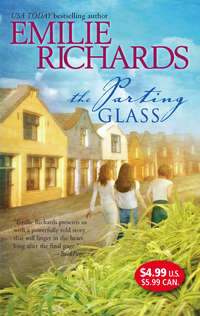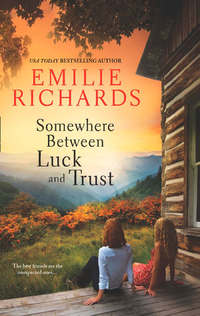
Полная версия
Rising Tides
“I don’t know. It’s just a feeling. But why would Grandmère call us together in this remarkable way un less she had more plans for us? So far, nothing’s come out of our being together. There’s got to be more in store.”
“I’m leaving by noon.”
Dawn snapped one final photograph. Her father’s arms were folded, and his expression was supremely confident. Only rarely did anyone get the best of Ferris Lee. But in life, Aurore Gerritsen had been every bit as determined. And clearly, even in death, her determination had not faltered.
The only room in the cottage that was large enough to hold everyone was a screened porch, referred to as the morning room, which looked over a patch of yellow chamomile rimmed with magnolias and oaks. Storm clouds were gathering, but the occasional shaft of sun light beamed brightly in protest.
The bucolic setting was a touch of humor in a situation that merited more. As a journalist, Ben had grown used to insinuating himself into situations where he wasn’t wanted. He could not recall a time, however, when he had been so completely uncomfortable. He couldn’t dredge up enough sanctimony to suit the occasion. The Gerritsens didn’t want him here, and their objection was fair. They didn’t know that he was here to claim more than whatever small token Dawn’s grand mother had left him.
From his wicker vantage point in the corner, he watched the others straggle in. He remembered Dawn’s theory about Aurore’s sense of the dramatic. Whether it was true or not, the participants in this odd event were players in a pageant of Louisiana history, and he knew enough about all of them to appreciate it.
Dawn’s mother took her place in an overstuffed chair in the corner. She was sugarcane and old Creole blood lines that rivaled Aurore Gerritsen’s own. Cappy was a thriving symbol of a way of life that had passed on al most a century before.
He lifted his hand to Nicky and Jake, who settled across the room from Cappy. He knew a little of Nicky’s background from things that Phillip had told him. She had spent her childhood years watching the birth of jazz from a house on Basin Street, near today’s Club Valentine. She had gone on to Paris and later New York, but it had been the New Orleans in her voice that made her a star. Phillip’s only claims to Louisiana were his mother’s heritage and his recent marriage to a New Orleans woman, a fact Ben had discovered last night.
Jake’s roots were nowhere near as exotic as Nicky’s. Born into a family of sharecroppers, he had pulled him self from poverty by leaving Louisiana and venturing into a world where sometimes, at least, the color of a man’s skin was less important than what he was made of. But after his success was assured, he and Nicky had moved back to the state of their birth, with its deeply rooted culture and its enthusiasm for her talent.
Pelichere was a Cajun, descended from those brave souls, thrust from their homes in Acadia, who had found their way to the Louisiana bayous and a way of life rich in color and tradition. Ben liked her. She was as down-to-earth as the life she led. She, along with Spencer St. Amant, seemed perfectly willing to cut through the bull shit the rest of them wallowed in.
Finally there were Ferris Gerritsen and his daughter, the last to arrive. The senator was a mixture of his mother’s Creole blood and his father Henry’s perversion of it. From the distance of half a century, it was difficult to understand what Henry Gerritsen had offered a woman like Aurore Le Danois. He had been descended from a “Kaintuck” who floated a flatboat down the Mississippi, sold it for lumber in New Orleans, then started a business brokering boats for others. Somewhere on the trip, at some saloon or floating whorehouse, he had picked up Henry’s grandmother, and nine months later, Henry’s father had been born.
Ben had heard that story from Father Hugh. Apparently Henry had enjoyed telling it to his children, per haps because his lack of breeding humiliated his wife. The story had given Ben a certain understanding of Ferris. If anyone could understand Ferris.
And what of Ferris’s daughter? What was there to understand about Dawn? She smiled at Ben before seating herself ten feet from his chair, and the smile curdled his blood. She wore shorts that bared her legs and belly button and curved over hips shaped like an invitation. Everything about her seemed calculated to prove that she was nobody’s little girl.
He missed the vulnerability of the Dawn he had known, but this new woman intrigued him just as much. He imagined traces of the vulnerability were still there, layered under a new self-confidence and independence. But she had learned how to protect herself. He just hoped she had learned from whom.
The pageant ended with Spencer, another gracious remnant of New Orleans’s splendored past, who had come to the morning room with Pelichere. Now that everyone had arrived, he rose. Spencer stooped, as if he carried a heavy burden, but he seemed determined to see the morning through.
“I’m happy everybody stayed,” he said. “That was Mrs. Gerritsen’s wish. The rest of her wishes are just as specific. I’ll elaborate on them now. The reading of this will is going to be conducted exactly the way I promised Mrs. Gerritsen that it would be. I will not deviate in even one small detail.”
Ben admired Spencer as he spoke. A good gust of Betsy-generated wind would send the old man spinning, yet he possessed a composure that Ben could envy. He supposed it came with age and battles won. There was no way to fabricate it. Father Hugh had possessed it, too.
Ben listened as Spencer repeated the conditions he had communicated to them last night. It was all so mysterious, yet everything fit with what Ben knew of Aurore. Like Spencer’s, Aurore’s looks had been deceiving. He wished he could have known her as a young woman. What had Dawn taken from her grand mother, other than the English equivalent of her name?
“Before I continue,” Spencer said, “I’ll point out that Mrs. Gerritsen was very specific. You are to be in residence here, and there are to be no exceptions. If you need to leave for a brief period, please arrange it with me.”
Ferris got to his feet. “Everyone here has better things to do than play games with a dead woman. My mother won’t know if her wishes are carried out. You must be aware that these conditions can be challenged in court. What judge would believe my mother was competent when she made this will?”
“It’s possible you’re right, Senator. You could certainly attempt a challenge. You might win. Of course, there are a number of people who spent time with your mother during her final days who would swear to her competency.”
Ben watched Dawn touch her father’s arm. Reluctantly, Ferris sat down. “I’m sorry,” Dawn said to Spencer, “but you have to admit, this is unusual. You’ll have to give us all a little time to adjust.”
He smiled at her, only at her. “Shall we get on with the first bequests, then?”
Dawn looked around the room, as if counting votes. “Is anyone leaving?” Her gaze stopped at Ben.
He shook his head slowly. She lifted one brow be fore she turned away from him. “Shoot, Spencer.”
He looked down at the document in his hands. “As a matter of fact, my dear, the first bequests go to you, and to Ben.” He reached inside his coat pocket and pulled out two small boxes. He stepped forward and held out one to Dawn, then moved across the room to give the other to Ben.
“Any rules on how or when to open this?” Dawn asked.
Spencer slipped his papers inside his jacket. “None. And now we’re done for the rest of the day. We’ll meet here tomorrow morning at the same time.”
“Done?” This time Cappy stood. “Really, Ferris is right. I have a house to look after, and commitments I’ve made. What’s the purpose of cooping us up like rats in a cage?”
Spencer bent his head, but his words were clear. “It may take some time to discover the purpose.”
“I think my mother-in-law lost her mind, and you assisted.” Cappy swept out of the room, much as she had swept in. Ferris was slower to exit. He bent his head to Dawn’s for a moment, then shook it after she opened the box, as if to say he agreed with his wife. He took one last, assessing look around the room before he followed Cappy.
Ben kept his eyes on Dawn. She had opened her box, and the contents seemed to fascinate her. The box was the size a jeweler might use for a necklace or a brooch. Like his, it didn’t appear to have been wrapped or marked with any emblem.
“So what are you planning to do?”
Ben realized Phillip was at his side. “What should I do?”
“Open it, and see what’s going on.”
Ben flipped off the lid. A key, old and tarnished, lay inside. “How did Mrs. Gerritsen know what I’d always wanted?”
Nicky and Jake came over to examine the key. Ben glanced at Dawn and was surprised to find her looking at him. She held up another key, smaller than his.
Phillip stepped aside so that Ben and Dawn were looking straight at each other. “Do you suppose the two keys are related?” he asked her.
Dawn rose. “Maybe they’re related, and maybe they aren’t.” She strolled toward Ben. “Would you like to see mine? Or does the fact that it’s been in my hand make you squeamish?”
“You’d be surprised what I can tolerate.”
Dawn dropped her key in his hand. “Mean anything to you?”
He glanced down. “No more than mine. Was your grandmother some sort of a practical joker?”
“Never.”
“Does my key look familiar to you?” He held out his hand.
She took back her own and stared at his for a moment. “A key is a key.”
“It usually leads somewhere.”
“Not in Aurore’s Wonderland,” she said. “Mine’s too small to go to a door. And yours is too old to go to any of the doors in this house. All the locks were updated years ago.”
“All?”
“I think so. Peli?” She motioned for Pelichere to join them. “Would Ben’s key fit any of the locks in the cottage?”
Pelichere squinted, then shook her head. “No.”
“Maybe the keys are symbolic.” Ben cushioned his in the palm of his hand. “The old and the new?”
“Mine’s not new,” Dawn said. “It’s small, but it’s old.”
“The large and the small? Does this mean anything to you?” When she shook her head, he shrugged. “It appears we have two keys to nothing.” Ben dropped his in his shirt pocket.
“No. My grandmother had a reason for this. I know she did,” Dawn said.
Silently Ben congratulated her. As awkward as the situation had to be, she was trying to make sense of it. “We share some history. Maybe the keys are related to that.”
“There’s nothing between us,” Dawn said. “Except that once you called me a murderer.”
“Do you really want to talk about that now?” Ben asked.
Dawn glanced at Nicky, who had silently been taking in the conversation. “I’m sorry, Mrs. Reynolds,” she said. “This must seem crazy to you. Apparently this has nothing to do with you and your family.”
“I think you and Ben might need some time to cool off. Don’t you?”
Nicky might be a stranger to the Gerritsens, but she was already taking charge of the situation. As Ben watched, Dawn nodded. Then she turned to him. “You pride yourself on getting the facts straight. Tell Spencer I’m going for a walk, will you? God knows I wouldn’t want to be forced to give back my key.”
The garconnière was one of the few original out buildings still left on the Gerritsen property. Once the house and land had belonged to Pelichere’s great-uncle. Dawn wasn’t entirely certain now if a story her grand mother had told about riding out a childhood hurricane inside its walls was fact, or a fiction she had embroidered over the years. But she did know that her grandmother had purchased the property in the twenties.
As a child, Dawn had not been allowed to play in most of the outbuildings, some of which had been torn down to protect her. But the garconnière, like the house, was built of bousillage, an adobelike mixture of mud and Spanish moss packed between cypress boards. Traditionally, a garconnière was a place for bachelors in Cajun families to live until they were married, usually an attic reached by stairs from the end of the gallery.
Perhaps the architect of the cottage had been wealthier than the typical Grand Isle resident, or perhaps he had been blessed with so many rowdy sons that he was persuaded by a pleading wife to build the structure far away. Whatever the reason, the garconnière perched at the edge of the Gerritsen property. The building was narrow and two-story, with an outside stairway leading to sleeping quarters. The low-ceilinged bottom story had been used as work space, and the remnants of a primitive forge still took up half of it.
Each summer Dawn had escaped to the nineteenth-century bachelor pad to play. There had been armoires full of old-fashioned resort wear, and photographs and mementos to admire. Some of the photographs had been of her grandmother, a doe-eyed young woman with piles of hair and a waist to rival Scarlett O’Hara’s. The photographs had been so significant to the young Dawn. How important to be the one taking them, to steal tiny pieces of life and preserve them forever.
She hadn’t been inside in years. Vines obscured much of the building now, along with overgrown ligustrum and sasanqua, and she thought of it only when a long afternoon of childhood memories threatened to overwhelm her.
The hours after receiving the key had been quiet ones, as if everyone had agreed that peace could be achieved only by silence. After her walk, she had re treated to her room and stared out at her personal smidgen of Gulf. Bits of her childhood had claimed her. The day her uncle had tried to teach her to swim, and she had sobbed in his arms at her own cowardice. The day, the rare and glorious day, when her mother had awakened her for a breakfast picnic, and all the things that had always been wrong between them had disappeared for the morning.
Sometime after noon, she had thought of the garconnière. Sometime after that, she had thought of the lock that had probably never been changed because the building was so well hidden that vandalism was unlikely.
It was nearly four before she gathered her strength to find Ben and ask him to go with her to investigate. She didn’t lack courage, just the desire to be in his presence. Curiosity was stronger.
She didn’t find Ben, but she found Phillip on the front gallery, rocking away his tension. He was a hand some man, with an easy smile and dark eyes that seemed to be taking the world’s measure. She had always ad mired his writing. He didn’t know how to waste words, and he didn’t know how to tell a story that was sentimental or simplistic. Her uncle had been the one to introduce her to his work.
She folded her arms and lounged against a pillar. “I might know what Ben’s key fits. There’s a building on the property, the original garconnière. The top story had an old-fashioned lock.”
“What about yours?”
“Mine might fit something inside.”
“Maybe you need Ben after all.”
“Might be he needs me, too. Who knows what my key will unlock, or who’ll benefit?” She saw Ben standing at the door. “I was just telling Phillip I might know what your key unlocks.” She told him what she had told Phillip.
“I’m willing to give it a try.” Ben pushed open the screen door but was careful not to let it slam shut. Phillip stood and stretched. “Would you like to come?” Ben asked him.
Phillip looked from one to the other. “I don’t think so. Likely to get me shot,” Phillip said. “Old Ferris Lee sees me disappearing into the undergrowth with his only daughter, I’m a dead man, and no jury in Louisiana would give a damn.”
She had to smile at the drawl Phillip switched on and off at will, even though there was nothing funny about what was essentially the truth. “I’m planning to tell old Ferris Lee where I’m going and why,” she said.
She found her parents in the dining room. Her mother was polishing silver. Her father was reading the New Or leans States-Item and finishing what looked to be the most recent of a dozen cigarettes.
The picture was one of domestic bliss. She tried to remember how often she had seen her parents this way. At home they were seldom in the same room unless they were giving a party. Despite that apparent lack of intimacy, she had no reason to believe they were unhappy together. On the contrary, they seemed perfectly suited. Her father’s career had become her mother’s, too. Had she married a simple attorney or businessman, Cappy’s life would have revolved around bettering their position socially, perhaps striving toward the day when her husband would be declared king of carnival, an honor truly understood only in New Orleans.
But Cappy had married Ferris Lee, and had been given more to strive for. First the state senate, now the governor’s mansion. There was even talk of a run for the presidency somewhere down the road. Ferris lacked George Wallace’s sneer and vicious rhetoric, but he shared his political and social views. How many of the women who had worshiped President Kennedy’s smile, if not his politics, would come flocking to Ferris Lee Gerritsen for both?
When she realized her parents were waiting, Dawn explained where she was going.
“I don’t understand why you’re pursuing this,” her mother said.
Dawn picked up a platter and rubbed her thumb across the edge. “Just think of it as emotional silver-polishing.”
Ferris stubbed out his cigarette. “Your mother and I are going out for dinner.”
Dawn was surprised. “What does Spencer say?”
“There won’t be a problem, though I’ve got half a mind not to come back anyway.”
“You don’t mean that.”
“You don’t know what I mean, darling.” He lit an other cigarette.
She turned to Cappy. “Use your charm, Mother. Make sure he comes back.”
Cappy gave a real smile for the first time since their reunion. “You always ask me for the impossible.”
Dawn couldn’t remember ever asking Cappy for any thing except her love. But perhaps that was exactly what Cappy had meant.
Ben was alone on the gallery when she returned. “I’m ready if you are,” she said.
“Let’s get it over with.”
The path was as badly overgrown as she’d feared. Morning glory and creeper screened dead and dying trees, and the still air was heavy with the scent of decay.
They reached the garconnière without having exchanged one word. Dawn gestured toward the steps. “I’ll go first.” At the top, she stepped aside and gestured toward the door. “Voilà.”
With no ceremony, he took the key from his pocket and thrust it into the lock. He turned it, and the door swung open.
He faced her. “Surprised?”
“More than a little.” She entered first, since he was obviously waiting for her. Her eyes adjusted slowly. The room was the size of a French Quarter bar. There were six windows, old-fashioned double-hung panes grimy with dirt. Everything was just as she remembered it; in fact, it was hard to believe anyone had been inside in a decade.
Ben whistled softly. “Such wealth. How am I going to get this back to San Francisco?”
The idea was so ludicrous that she had to laugh. “Shipping the dust will eat up your life savings.”
“Got your key handy?”
“See anything I could unlock?”
He went to the nearest window and used a corner of a faded green curtain to dust it. The room grew subtly brighter, and she followed his lead, until all the windows had been wiped down. “I guess we’d better start some where and work our way around the room.”
“Did your grandmother ever throw anything away?”
“Apparently not.” Dawn approached an old chest with a cracked marble top. All the drawers opened easily. Something rustled in the corner of one, and she slammed it shut. “Mice.”
“If that’s the worst we find, we’ll be lucky.”
“Please.” She tried an armoire, packed full of filmy, fragile dresses spanning half a century in style. “There are museums that would love to have these.”
“I haven’t seen anything that needs a key.”
“We’re not done.”
She rummaged through boxes of dusty books and mementos, while Ben methodically examined furniture. They had almost progressed around the room before Dawn spotted the trunk. She remembered it well be cause it was the same one that had held all the family photographs. Some of the photographs were still there, but now half the space was taken up by a small leather suitcase.
Dawn sat cross-legged and lifted the case to her lap. She traced her grandmother’s initials, gold against dark blue. “Look.”
Ben squatted beside her. “Locked?”
She reached inside her pocket for the key. The lock opened as easily as the door. She lifted out a black leather journal. The pages were edged with gold, like a Bible. The first page was inscribed in fountain pen. The script was rounded and carefully formed. With childish whimsy, an ink blot had been turned into a tiny spider.
She was puzzled. She was halfway through the page before she realized who it belonged to. “Ben, this is Uncle Hugh’s journal. I didn’t even know he’d kept one.”
She looked up. Ben’s eyes were shadowed. “I’ve wondered what happened to it.”
“Then you knew?”
“I lived with him that last summer. I saw him writing in it sometimes. When I got out of the hospital and went back…to the rectory, I looked for it. But all his things were gone by then.”
She leafed through it. “It starts when he’s about ten, I think, and it’s pretty sporadic. But look, it’s nearly filled. Almost like…” She didn’t want to go on.
Ben finished for her. “Like his life and the pages ran out together.”
She didn’t want to think about that. “There’s more.”
She set the journal beside her and took out a lavender metal box decorated with pansies and violets. Inside, she found a thick stack of letters tied with a black rib bon.
The letters were more faded than the journal. In the dim light, she was forced to squint to make out words. “This one’s addressed to a Father Grimaud. Look, it’s in French.”
He squinted, too. “I studied Latin.”
“My French is acceptable.”
“Phillip’s is perfect, if you need a translator. Who are they from?”
She turned the first one over. “Lucien Le Danois.” She looked up at Ben. “He was my great-grandfather.”
“So what does this have to do with me?”
There hadn’t been time to ask herself that question. Now Dawn realized how important it was. “I don’t know. What do you think?”
He shrugged.
Dawn realized she was hugging the letters to her chest. “If Grandmère had only wanted me to have these, she would have given me both of the keys. Or she wouldn’t have bothered with keys at all. Spencer would have handed me the suitcase this morning on the porch. Do you see? Obviously she wanted us to work together.”
“What right do I have to delve into your family history?”
“I don’t know. Do you have any theories?”
“I haven’t had time to concoct any.” He stood. “What are you going to do?”
“I’m going to take the letters back to the house and read them.” She stood, too. She met his eyes, and for a moment she didn’t speak. Then she held out her uncle’s journal. “You take this.”
“Why?”
“Think about it. Grandmère wanted us both to find the case. Obviously she wanted you to be part of this. You don’t speak French, but you were with my uncle when he died.”
“Why do you want me to be part of this?”
“I don’t. But my grandmother did. Besides, don’t you need something to do besides sit around and judge me and my family?” Reluctantly she inched the journal closer to him.
He took it with something that seemed remarkably like gratitude.
“So, you want to share what we find at breakfast to morrow?” she asked.
“If we find anything.”
She put the empty suitcase back in the trunk and led the way out. The sky had darkened by the time they emerged. They had come in silence, but now that seemed intolerable. Her grandmother’s strange offering had tilted the balance between them. Dawn no longer knew exactly what to think.







